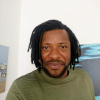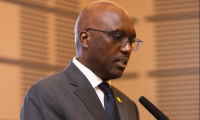Rex Lawson: Decades of highlife reverberation
Highlife music was the foremost sound from West Africa, mainly Ghana and Nigeria, in the 1950s, reaching a remarkable height in the '60s and '70s. The genre originated in present-day Ghana in the early 20th century and uses the melodic and main rhythmic structures of traditional Akan music, but is played with Western instruments.
 Rex Jim Lawson provided a musical template for modern-day Nigerian artist.
Rex Jim Lawson provided a musical template for modern-day Nigerian artist.
In the 1920s, Ghanaian musicians incorporated foreign influences like the foxtrot and calypso and blended them with Ghanaian rhythms like osibisaba (Fante). Highlife was associated with the local African aristocracy during the colonial period and was played by numerous bands such as the Jazz Kings, Cape Coast Sugar Babies and Accra Orchestra, along the country's coast.
The upper-class audience that enjoyed the genre in select clubs gave the music its name. Highlife is characterized by jazzy horns and multiple guitars leading the band. Recently it has acquired an up-tempo, synth-driven sound, with highlife guitar lines modeled after the Afro-Cuban guajeo. The bell pattern known in Cuba as the clave is indigenous to Ghana and Nigeria and is used in highlife music.
As young Nigerians of that era embraced highlife and added local ingenuity to their renditions, it became the toast of entertainment in the country. Among the multitalented proponents of this music were Bobby Benson, Fela Ransome Kuti’s Koola Lobitos, Sir Victor Olaiya and many others, taking the airwaves by storm.
The list of Nigeria’s highlife icons of the 1960-70s is incomplete without mentioning the one and only Rex Jim Lawson. Lawson was born on 4 March 1938 to a Kalabari (Rivers State today) father and an Igbo mother from Owerri. Starting out in Port Harcourt, with a mastery of the trumpet and rhythm guitar, he moved to Lagos in 1958, according to his percussionist Tony Odili, who is 92 years old today.
Lawson played with the top Nigeria highlife musicians of the time, such as Sammy Obot, Bobby Benson, Chris Ajilo and Victor Olaiya before moving to Cameroon to refine a style that would reverberate for decades to come.
Coming back to Nigeria in the early '60s, his genius was obvious and in the following years he produced tracks like 'Angelina Pay My Money', 'Baby Play Me Wayo', 'Ata Bla Woman', 'So Ala Temen', 'Bere Bote', 'Ibinabo' and 'Jolly Papa'. He also sang 'Yellow Sisi' that was later covered in the early 1980s by Orlando Owoh. Another rare track of note 'Okoh', a rhythmic singalong with a guitar and muted trumpet dominating its flow. 'Okoh' was later covered by Cameroonian master Manu Dibango in 1980 to great acclaim.
Highlife before Rex Lawson had been centered around Igbo, English and Yoruba. He opened up the Niger Delta sound, which had not enjoyed national exposure before his time. The track 'Tamuno Bo Iboro Ma' was his first big hit in Kalabari and made big waves in Nigeria. He introduced a visceral style that was authentically Delta: the native beat!
While most other bands were working towards the refined big-band format, Lawson was a street fighter who combined the fine sounds he learnt from Bobby Benson with his traditional Kalabari phrasing and expressions that spoke of an ethnic identity that had been silent before him. He was one of the first to record singles in Pidgin, which gave ordinary people the impression that he could not speak English. Of course, Lawson spoke perfect English despite such rumours.
After his heyday, artists such as Fela Kuti began emplying Pidgin in his music, followed by several highlifers and Naija 'hip-hoppers' today. His melodies and phrases continue to be recycled to this day.
These direct references by artists such as Flavour ('Sawale'), Larry Gaaga & 2Baba (Iworiwo), Zubby ('Love Adure') and several others. His influence is also easily recognisable in J Martins, Wizkid and Duncan Mighty.
The imprints of Rex Jim Lawson are large in West African music today. Sadly, many are not aware that they are working with his templates. In June 2018, Rivers State governor Nyesom Wike and the Ooni of Ife, Adeyeye Enitan Ogunwusi, commissioned the Rex Lawson Cultural Centre in Port Harcourt, recognising his great contribution to African music.































Comments
Log in or register to post comments